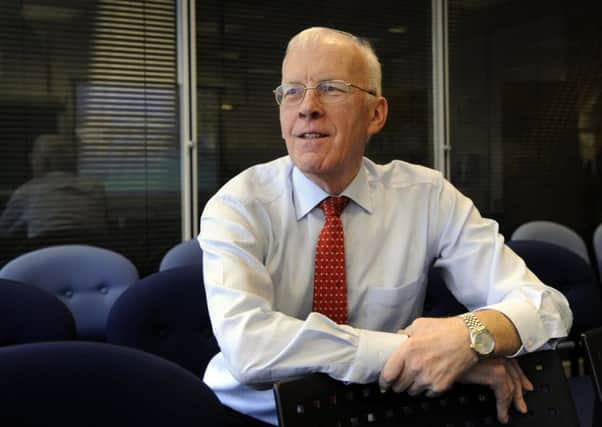Sir Ian Wood: Hard work to improve opportunities


The turn of the year is a time for reflection and an opportunity to look forward to the challenges ahead in the new year.
The Wood Family Trust (WFT), the venture philanthropy trust set up by my family, has been supporting individuals and communities across Sub Saharan Africa and Scotland for six years, but next year we are taking our first step in the fight to help alleviate the daily struggles of a life in poverty that are faced by one in five of Scotland’s children: that’s an astonishing 220,000 children.
Advertisement
Hide AdAdvertisement
Hide AdResearch indicates that 95,000 of these children live in the most severe poverty where there simply isn’t enough money to pay for essential items. That there are children across Scotland who don’t have a bed of their own, nor appropriate winter clothing, nor even enough food to eat, is deeply concerning, and I believe that we all have a moral obligation to work to change this.
Our philanthropic focus in Scotland in our start-up period has been of enabling opportunities for youth around citizenship, enterprise and positive destinations into employment, to help our next generation be more caring, tolerant, contributing and independent citizens.
However, child poverty is a more basic and distressing issue with wide-ranging and long-lasting consequences. Evidence indicates that children from low-income families are less likely to succeed in school, more likely to suffer ill-health, and are more likely to face pressures associated with antisocial behaviours and criminality. It is difficult to measure the cost in physical or emotional suffering of a child living in a damp or overcrowded home, or growing up in a deprived community where hope of a better life is constantly dashed.
To end child poverty in Scotland, significant and fundamental societal changes are required. Poverty is an unacceptable part of our economy and, in order to realise change, we must first believe that an alternative is possible. We have a collective responsibility to alter the face of child poverty and, as well as alleviation actions, we must try to tackle the root causes. I believe it is possible to transform the trajectory of the lives of our young people. Research indicates that by supporting systemic change through investment in innovative and effective projects that make a significant difference to the most disadvantaged and at-risk children and young people in Scotland, it is possible to drive this long-term change.
In 2013, WFT undertook to contribute £150,000 a year, over three years, to the STV appeal against child poverty in Scotland which, as well as a number of programmes addressing both causes and effects of poverty, seeks to understand the misconceptions and attitudes surrounding the issue.
A key theme is employment. I am currently chairing a commission in Scotland – Developing Scotland’s Young Workforce – which is tasked with bringing forward a range of recommendations designed to improve the qualifications, prospects and employability of young people going through school and college, and is also encouraging business and industry to take on more young people. Right now, there are 64,000 young people in Scotland waking up each morning and wondering if their community needs them. We must help as many of these young people as possible into employment so that, as they progress to parenthood, they are in a position where they can provide for their family and avoid the plight of child poverty.
We need to recognise that money alone will not solve child poverty, but meaningful employment and employability can be a key catalyst for change.
The role of business is crucial in changing attitudes and enabling young people to have the best possible start in life.
Advertisement
Hide AdAdvertisement
Hide AdBut it is too simple to say that child poverty is a symptom of unemployment. Figures from a Households Below Average Income report by the Department for Work and Pensions show that 61 per cent of child poverty occurs in households where at least one adult is working.
Enterprise and employability can make a real and sustainable difference in helping to lift individuals out of a life of poverty. Yet it is about more than merely earning a wage. Employment develops life skills, confidence and gives people the opportunity and ambition to break down barriers. This should reduce the risk of future generations of vulnerable children.
In 2013, 25 per cent of the funds raised by the STV appeal are being invested in projects focused on employability, including a One Parent Family Scotland project that delivers tailored services and training for young lone parents. The programme plays an important role in strengthening the connections between young parents and their families with mainstream services. Supporting young parents to develop new capacities, skills, and knowledge can only strengthen their ability to look after their family and to link into their community.
The project is active in a number of regions, including Glasgow where there is an average 33 per cent level of child poverty. But in some parts of the city this reaches 43 per cent.
A society that allows, in some areas of the country, more than 40 per cent of its young people to battle child poverty is one that must change. That is our collective responsibility and we need to work collaboratively. A New Year resolution for Scotland in 2014 should be to bring about that change for those young people that most need our support.
• Sir Ian Wood is chairman of Wood Family Trust and a Trustee of the STV appeal.